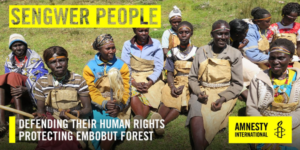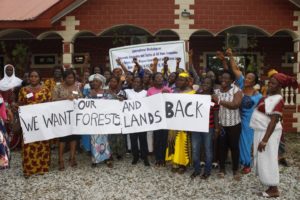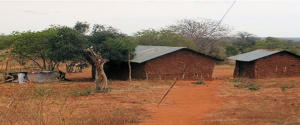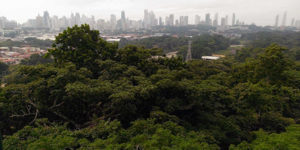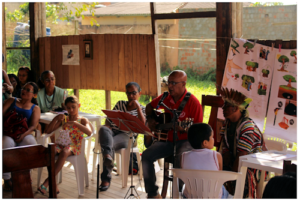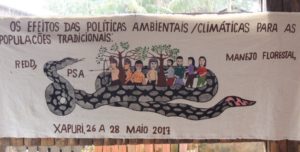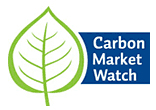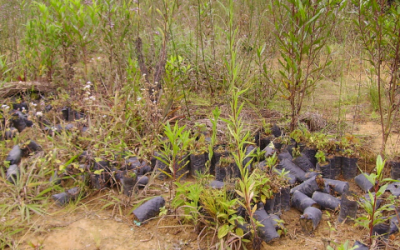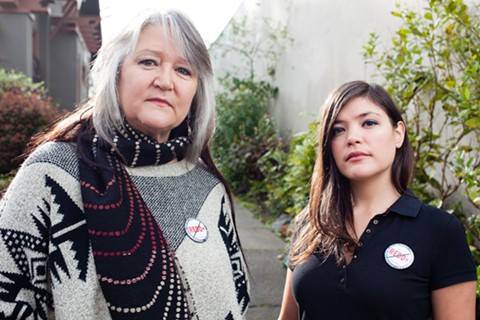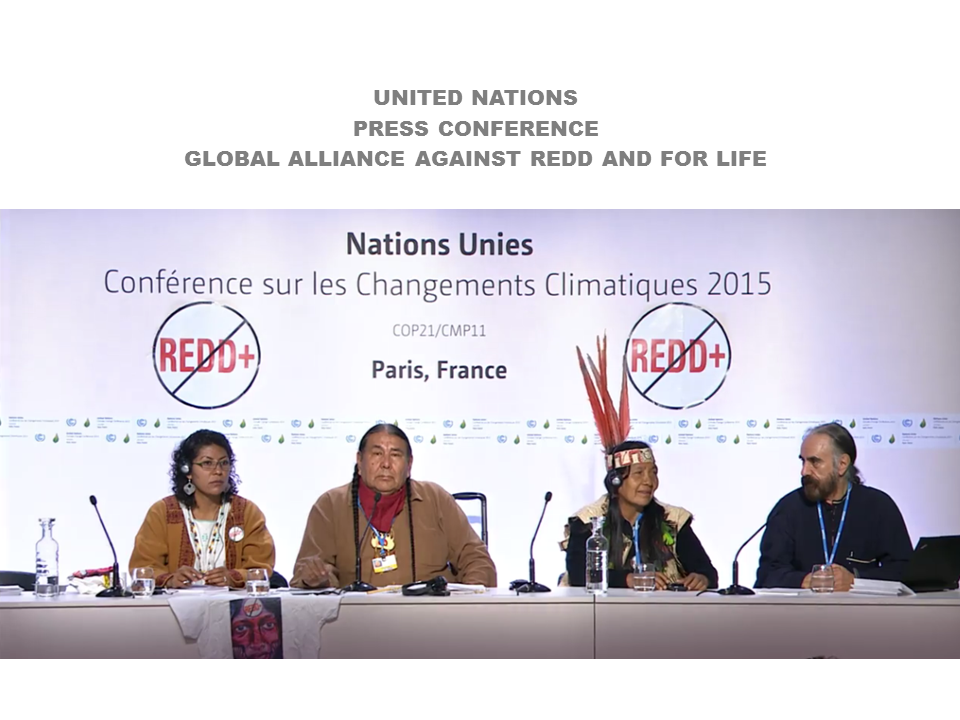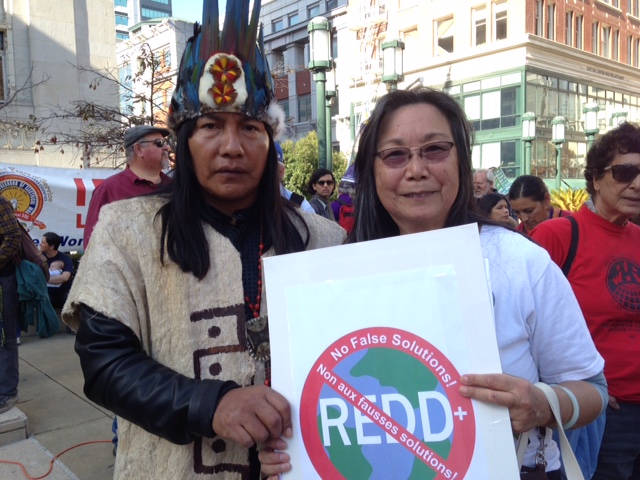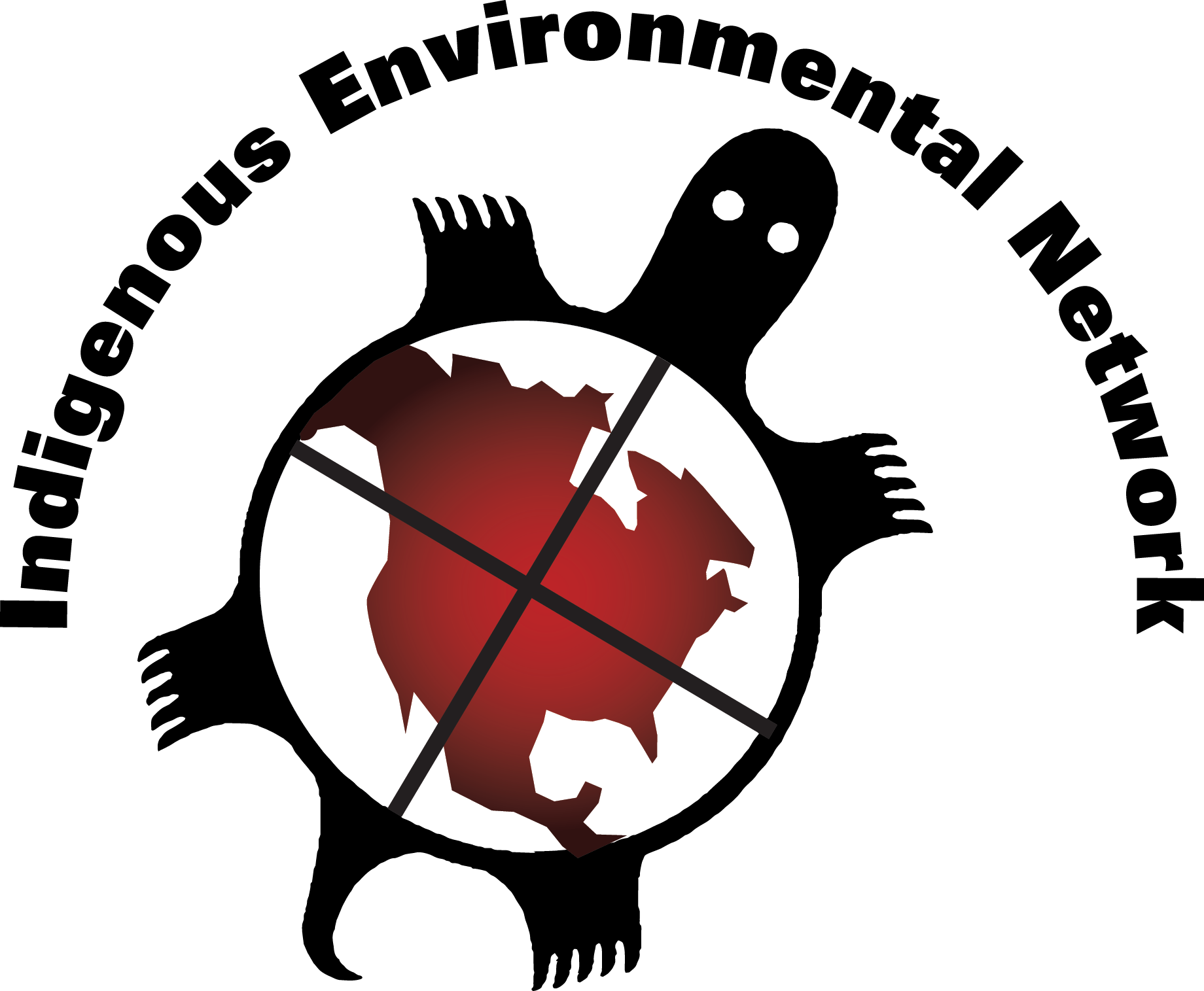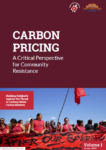 The majority of the tools for mitigating climate change, both within the US and globally, focus on carbon pricing and carbon counting, and continue to exploit people and communities most impacted by climate change, while providing special favors to the very fossil fuel and agricultural industry corporations most responsible for climate change.
The majority of the tools for mitigating climate change, both within the US and globally, focus on carbon pricing and carbon counting, and continue to exploit people and communities most impacted by climate change, while providing special favors to the very fossil fuel and agricultural industry corporations most responsible for climate change.
Click here to Read / Download this report. Click here to Download a high resolution copy for commercial print.
Comments to the California Air Resources Board
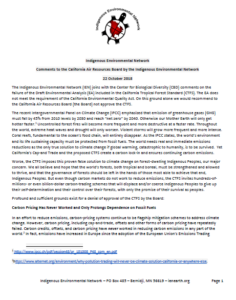 The Indigenous Environmental Network (IEN) joins with the Center for Biological Diversity (CBD) comments on the failure of the Draft Environmental Analysis (EA) included in the California Tropical Forest Standard (CTFS). The EA does not meet the requirement of the California Environmental Quality Act. On this ground alone we would recommend to the California Air Resources Board (the Board) not approve the CTFS.
The Indigenous Environmental Network (IEN) joins with the Center for Biological Diversity (CBD) comments on the failure of the Draft Environmental Analysis (EA) included in the California Tropical Forest Standard (CTFS). The EA does not meet the requirement of the California Environmental Quality Act. On this ground alone we would recommend to the California Air Resources Board (the Board) not approve the CTFS.The recent Intergovernmental Panel on Climate Change (IPCC) emphasized that emission of greenhouse gases (GHG) must fall by 45% from 2010 levels by 2030 and reach “net zero” by 2040. Otherwise our Mother Earth will only get hotter faster.[1] Uncontrolled forest fires will become more frequent and more destructive at a faster rate. Throughout the world, extreme heat waves and drought will only worsen. Violent storms will grow more frequent and more intense. Click here to READ ALL
Updates From REDDMonitor.org
RSS url is invalid or broken
Open letter by the Swift Foundation rejects REDD and carbon trading as false solutions to climate change
 On 11 September 2018, shortly before the Global Climate Action Summit in San Francisco, 17 foundations signed on to a “Joint Statement Supporting Forests, Rights, and Lands for Climate”.
On 11 September 2018, shortly before the Global Climate Action Summit in San Francisco, 17 foundations signed on to a “Joint Statement Supporting Forests, Rights, and Lands for Climate”.
The foundations promised that by the end of 2022, they would provide at least US$459 million in support of land-based solutions to climate change.
The Swift Foundation, one of the foundations that signed on to the statement, issued an open letter yesterday, clarifying its interpretation and commitment to the statement. In the open letter, the Swift Foundation explicitly rejects REDD, and carbon trading schemes of any kind, as false solutions.
Kenya’s REDD programme risks exacerbating violence against indigenous Sengwer communities in Embobut forest
Since January 2014, Kenya Forest Service guards have carried out a series of violent evictions of the Sengwer indigenous people from their homes in Embobut forest. While the evictions took place the Kenya Forest Service was funded by international donors, including the World Bank, the European Union, and the Finnish government.
These internationally funded aid projects failed to learn the lessons from the previous projects. The evictions and violence against the Sengwer, and other indigenous peoples in Kenya, were simply ignored in project documents.
Now the UNDP and the Japan International Co-operation Agency (JICA) are working on developing a REDD programme in Kenya. A Draft Project Document produced in February 2018 shows no sign that any lessons have been learned.
Petition: Stop all forms of abuse against women in large monoculture tree plantations
The petition is an urgent request from women in Africa to stop the suffering and the violent impacts the expansion of industrial oil palm plantations is creating on womens´ lives, that affect women in and outside the African continent: Violence, sexual abuses, rape, harassment, persecution, destruction of their means of livelihoods.
Women want their lands back from the companies that got illegitimately hold of these through concessions given to them by governments. The women want their lands and forests back to continue being able to produce their food, they want food sovereignty!
IFC Throws Lifeline to REDD+ Project-Shoring up World’s Largest Mining Co.
BHP Billiton is the world’s largest mining and petroleum company running mines in 13 countries. Its main offices are in Melbourne, Australia, and in London, UK, where the company sells shares on the London Stock Exchange.
The London Mining Network, an alliance of human rights, development, environmental and solidarity groups, has compiled information about the many conflicts between the company and communities and workers affected by its mining operations and environmental disasters caused by the company’s mines. (1) These include the catastrophic flood of 40 million tonnes of toxic mud waste released into the Doce river in Minas Gerais, Brazil, in 2015 – the biggest environmental spill in the country’s history. (2) The toxic mud spread all the way to the sea, killing 19 people and requiring the evacuation of 600 more. Almost two years on, the Doce river still runs red from the iron ore in the water. BHP Billiton co-owns the mine with Brazilian mining firm, Vale. The two companies have faced public campaigns over inadequate clean-up efforts and compensation to those affected by the disaster. They also face fines and national and international legal cases over responsibility for the breach of the dam that was supposed to prevent their toxic waste from spilling into the river.
Environmental racism and cap-and-trade in California
In July 2017, California voted to extend its cap-and-trade scheme until 2030. Some environmental groups and the oil and gas industry support the legislation. Environmental justice groups oppose it. This post summarises some of the responses to the continuation of cap-and-trade in California.
Carbon trading was born with one foot in the grave and another on the banana peel. Gov. Brown’s championing free-market claims of the efficacy of cap-and-trade are a hair removed from the “voodoo economics” of the Reagan-era.
Nowhere on earth — not in the largest market (the EU ETS), nor in the smaller regional markets from the New England Regional Greenhouse Initiative (RGGI) market to the California cap-and-trade market to the newly minted Chinese market — has the carbon price ever been sufficiently high enough to drive the technological innovation to fully stop carbon pollution.
From REDD+ projects to ‘jurisdictional REDD+’: more bad news for the climate and communities
For many people, REDD+ is about projects that save forests. In reality, however, REDD+ has never been about protecting forests and also no longer really is about projects but about programmes covering whole regions or provinces within a country. Though many REDD+ projects continue to exist, causing harm to indigenous peoples and forest communities by restricting their traditional forest use practises. (1)
The idea of REDD+ has its roots in the UN climate negotiations. It was negotiated as a tool that would allow companies and industrialized countries to continue burning petroleum, coal and natural gas while claiming the emissions this causes do not harm the climate. REDD+, its advocates claim, would provide cheap compensation for the release of these emissions into the atmosphere and provide money to finance forest protection. Companies in industrialized countries could burn fossil carbon at home, that is the carbon stored underground for millions of years, and pay someone in a tropical forest country to keep some trees standing as a replacement carbon store. (2)
Governor Jerry Brown is working with the oil industry on California’s climate policy
California’s Global Warming Solutions Act of 2006 (AB 32) expires in 2020. California’s governor, Jerry Brown, is holding a series of closed-door negotiations with the fossil fuel industry to re-write California’s climate change policy for the period 2021 to 2030.
Early in June 2017, two Assembly Bills (AB 151 and AB 378) failed to get past California’s Assembly.
AB 378 was authored by Christina Garcia and two other Democrat Assembly members. It was supported by the California Environmental Justice Alliance and other members of California’s Environmental Justice movement.
In an Assembly vote on 1 June 2017, AB 378 was rejected by AB-378 was rejected by 35 votes for to 39 votes against.
AB 151 was also authored by Democrat Assembly members – Autumn Burke and Jim Cooper. It was far more industry-friendly than AB 378, and was supported by the Western States Petroleum Association and other industry groups.
Forest peoples in Brazil send a message to California: reject tropical forest offsets
California Governor Jerry Brown has aggressively positioned himself as a global climate leader to fill the vacuum created by the arrival of an ignorant climate change denier in the White House. But not all that glitters is green. The Governor has spent the last months promoting the expansion of complicated market-based carbon trading mechanisms, known as “Cap-and-Trade,” as a cornerstone of state and global climate policy — in a move that directly threatens vulnerable communities both in California and abroad.
California’s current Cap-and-Trade program is set to expire in 2020. Last summer the state legislature established ambitious and unprecedented emissions reductions goals for 2030, without extending the authorization of Cap-and-Trade. The Governor signed the emission reductions goals into law — but he made it clear that Cap-and-Trade was the primary option he would consider for meeting those goals.
Xapuri Declaration: “We reject any form of climate colonialism”
From 26 to 28 May 2017, a meeting took place in Xapuri, in the state of Acre, Brazil. The meeting brought together Apurinã, Huni Kui, Jaminawa, Manchineri and Shawadawa indigenous peoples, representatives of traditional communities, rubber tappers, academics and supporting organisations. The meeting’s theme was, “The effects of environmental / climatic policies on traditional populations”. The meeting was supported by Friends of the Earth International, the Indigenous Missionary Council (CIMI), the Rosa Luxemburg Foundation and the World Rainforest Movement.
New study adds urgency to end UN carbon offsetting scheme
Brussels 19 April 2017. The European Commission has released a new study showing major flaws in carbon offsets from the Clean Development Mechanism (CDM). As countries flesh out the rules to implement the Paris Agreement, Carbon Market Watch calls for an end to the scheme, and a shift away from offsetting as a climate policy approach.
OECD opens investigation into WWF in world first
 In an unprecedented move, a member of the Organization for Economic Co-operation and Development (OECD) has agreed to investigate a complaint that the World Wide Fund for Nature (WWF) has funded human rights abuses in Cameroon, beginning a process which until now has only been used for multinational businesses.
In an unprecedented move, a member of the Organization for Economic Co-operation and Development (OECD) has agreed to investigate a complaint that the World Wide Fund for Nature (WWF) has funded human rights abuses in Cameroon, beginning a process which until now has only been used for multinational businesses.
TAMS: Failed experiments with carbon in Madagascar
Once hailed as a pilot carbon project for the whole of Africa, by the time this video was made, in 2010, TAMS was at a halt and would never resume. In its wake it left unfulfilled promises of forest restoration, work and revenue. Andasibe did indeed become a test site for carbon projects, but the results have not been as widespread as its original promises.
Cap and Clear-Cut – California’s cap-and-trade system as investigated by East Bay Express
Just earlier this week, the East Bay Express, known for it's investigative and longform news and feature stories, just released an in depth article covering California's involvement in REDD. The Oakland-based weekly newspaper serving the Berkeley, Oakland, and East...
Paris climate terror could endure for generations
By Patrick Bond December 15, 2015 Paris witnessed both explicit terrorism by religious extremists on November 13 and a month later, implicit terrorism by carbon addicts negotiating a world treaty that guarantees catastrophic climate change. The first incident left...
PRESS CONFERENCE: “REDD: Contradiction and Violation of the Sacred”
(Dec 1, 2015) Indigenous leaders, Tom Goldtooth, Gloria Ushigua, Alberto Saldamondo, and Berenice Sanchez spoke at the COP 21 at a Press Conference on how REDD (Reducing Emissions from Deforestation and Degradation) violates Natural Law and the Sacred. REDD, a carbon...
Escaping carbon slavery: the view from Nigeria
via New Internationalist Magazine The climate negotiations have done worse than nothing to prevent climate change. Nigerian activist Adesuwa Uwagie-Ero takes us on a historical journey, and suggests some ways to shift the international process onto a path toward...
Jendog Lonewolf Release new rap video “Stop REDD”
From the heart of San Francisco Chinatown to the Amazon – people across borders unite to Stop REDD!
From the heart of San Francisco Chinatown to the Amazon - people across borders unite to Stop REDD! Mr. Ushigua, a leader of the Sapara People of Ecuador and Pam Tau Lee, chairperson Chinese Progressive Association of San Francisco at the Climate Justice March on Nov....
Open letter by the Swift Foundation rejects REDD and carbon trading as false solutions to climate change
 On 11 September 2018, shortly before the Global Climate Action Summit in San Francisco, 17 foundations signed on to a “Joint Statement Supporting Forests, Rights, and Lands for Climate”.
On 11 September 2018, shortly before the Global Climate Action Summit in San Francisco, 17 foundations signed on to a “Joint Statement Supporting Forests, Rights, and Lands for Climate”.
The foundations promised that by the end of 2022, they would provide at least US$459 million in support of land-based solutions to climate change.
The Swift Foundation, one of the foundations that signed on to the statement, issued an open letter yesterday, clarifying its interpretation and commitment to the statement. In the open letter, the Swift Foundation explicitly rejects REDD, and carbon trading schemes of any kind, as false solutions.
Kenya’s REDD programme risks exacerbating violence against indigenous Sengwer communities in Embobut forest
Since January 2014, Kenya Forest Service guards have carried out a series of violent evictions of the Sengwer indigenous people from their homes in Embobut forest. While the evictions took place the Kenya Forest Service was funded by international donors, including the World Bank, the European Union, and the Finnish government.
These internationally funded aid projects failed to learn the lessons from the previous projects. The evictions and violence against the Sengwer, and other indigenous peoples in Kenya, were simply ignored in project documents.
Now the UNDP and the Japan International Co-operation Agency (JICA) are working on developing a REDD programme in Kenya. A Draft Project Document produced in February 2018 shows no sign that any lessons have been learned.
Petition: Stop all forms of abuse against women in large monoculture tree plantations
The petition is an urgent request from women in Africa to stop the suffering and the violent impacts the expansion of industrial oil palm plantations is creating on womens´ lives, that affect women in and outside the African continent: Violence, sexual abuses, rape, harassment, persecution, destruction of their means of livelihoods.
Women want their lands back from the companies that got illegitimately hold of these through concessions given to them by governments. The women want their lands and forests back to continue being able to produce their food, they want food sovereignty!
IFC Throws Lifeline to REDD+ Project-Shoring up World’s Largest Mining Co.
BHP Billiton is the world’s largest mining and petroleum company running mines in 13 countries. Its main offices are in Melbourne, Australia, and in London, UK, where the company sells shares on the London Stock Exchange.
The London Mining Network, an alliance of human rights, development, environmental and solidarity groups, has compiled information about the many conflicts between the company and communities and workers affected by its mining operations and environmental disasters caused by the company’s mines. (1) These include the catastrophic flood of 40 million tonnes of toxic mud waste released into the Doce river in Minas Gerais, Brazil, in 2015 – the biggest environmental spill in the country’s history. (2) The toxic mud spread all the way to the sea, killing 19 people and requiring the evacuation of 600 more. Almost two years on, the Doce river still runs red from the iron ore in the water. BHP Billiton co-owns the mine with Brazilian mining firm, Vale. The two companies have faced public campaigns over inadequate clean-up efforts and compensation to those affected by the disaster. They also face fines and national and international legal cases over responsibility for the breach of the dam that was supposed to prevent their toxic waste from spilling into the river.
Environmental racism and cap-and-trade in California
In July 2017, California voted to extend its cap-and-trade scheme until 2030. Some environmental groups and the oil and gas industry support the legislation. Environmental justice groups oppose it. This post summarises some of the responses to the continuation of cap-and-trade in California.
Carbon trading was born with one foot in the grave and another on the banana peel. Gov. Brown’s championing free-market claims of the efficacy of cap-and-trade are a hair removed from the “voodoo economics” of the Reagan-era.
Nowhere on earth — not in the largest market (the EU ETS), nor in the smaller regional markets from the New England Regional Greenhouse Initiative (RGGI) market to the California cap-and-trade market to the newly minted Chinese market — has the carbon price ever been sufficiently high enough to drive the technological innovation to fully stop carbon pollution.
From REDD+ projects to ‘jurisdictional REDD+’: more bad news for the climate and communities
For many people, REDD+ is about projects that save forests. In reality, however, REDD+ has never been about protecting forests and also no longer really is about projects but about programmes covering whole regions or provinces within a country. Though many REDD+ projects continue to exist, causing harm to indigenous peoples and forest communities by restricting their traditional forest use practises. (1)
The idea of REDD+ has its roots in the UN climate negotiations. It was negotiated as a tool that would allow companies and industrialized countries to continue burning petroleum, coal and natural gas while claiming the emissions this causes do not harm the climate. REDD+, its advocates claim, would provide cheap compensation for the release of these emissions into the atmosphere and provide money to finance forest protection. Companies in industrialized countries could burn fossil carbon at home, that is the carbon stored underground for millions of years, and pay someone in a tropical forest country to keep some trees standing as a replacement carbon store. (2)
Governor Jerry Brown is working with the oil industry on California’s climate policy
California’s Global Warming Solutions Act of 2006 (AB 32) expires in 2020. California’s governor, Jerry Brown, is holding a series of closed-door negotiations with the fossil fuel industry to re-write California’s climate change policy for the period 2021 to 2030.
Early in June 2017, two Assembly Bills (AB 151 and AB 378) failed to get past California’s Assembly.
AB 378 was authored by Christina Garcia and two other Democrat Assembly members. It was supported by the California Environmental Justice Alliance and other members of California’s Environmental Justice movement.
In an Assembly vote on 1 June 2017, AB 378 was rejected by AB-378 was rejected by 35 votes for to 39 votes against.
AB 151 was also authored by Democrat Assembly members – Autumn Burke and Jim Cooper. It was far more industry-friendly than AB 378, and was supported by the Western States Petroleum Association and other industry groups.
Forest peoples in Brazil send a message to California: reject tropical forest offsets
California Governor Jerry Brown has aggressively positioned himself as a global climate leader to fill the vacuum created by the arrival of an ignorant climate change denier in the White House. But not all that glitters is green. The Governor has spent the last months promoting the expansion of complicated market-based carbon trading mechanisms, known as “Cap-and-Trade,” as a cornerstone of state and global climate policy — in a move that directly threatens vulnerable communities both in California and abroad.
California’s current Cap-and-Trade program is set to expire in 2020. Last summer the state legislature established ambitious and unprecedented emissions reductions goals for 2030, without extending the authorization of Cap-and-Trade. The Governor signed the emission reductions goals into law — but he made it clear that Cap-and-Trade was the primary option he would consider for meeting those goals.
Xapuri Declaration: “We reject any form of climate colonialism”
From 26 to 28 May 2017, a meeting took place in Xapuri, in the state of Acre, Brazil. The meeting brought together Apurinã, Huni Kui, Jaminawa, Manchineri and Shawadawa indigenous peoples, representatives of traditional communities, rubber tappers, academics and supporting organisations. The meeting’s theme was, “The effects of environmental / climatic policies on traditional populations”. The meeting was supported by Friends of the Earth International, the Indigenous Missionary Council (CIMI), the Rosa Luxemburg Foundation and the World Rainforest Movement.
New study adds urgency to end UN carbon offsetting scheme
Brussels 19 April 2017. The European Commission has released a new study showing major flaws in carbon offsets from the Clean Development Mechanism (CDM). As countries flesh out the rules to implement the Paris Agreement, Carbon Market Watch calls for an end to the scheme, and a shift away from offsetting as a climate policy approach.




